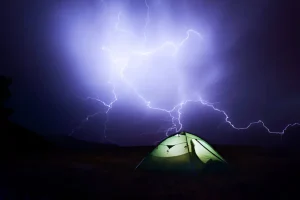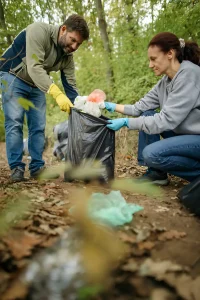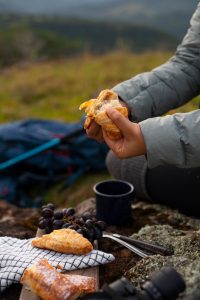Introduction: Embracing the Outdoors, Avoiding the Pitfalls
I still laugh when I think about my first camping trip. I packed way too much, forgot a flashlight, and realized at midnight that I had no idea how to set up my tent. Oh, and let’s not forget the rookie mistake of leaving food out—hello, raccoons!
Making camping mistakes is part of the adventure, but some errors can make your trip less fun (or even dangerous). Whether it’s forgetting weather-appropriate clothing, underestimating fire-starting skills, or not checking campground rules, many first-time campers face the same struggles.
The good news? You can avoid these common pitfalls and have a smooth, stress-free camping experience. In this guide, we’ll cover the 14 biggest first-time camping mistakes and how to prevent them. With a little planning and the right knowledge, you’ll be ready to enjoy nature, stay safe, and make unforgettable memories! ️
Planning and Preparation: The Foundation for Success
Proper planning is the key to a smooth camping trip. Without it, things can quickly go wrong—forgotten gear, unexpected weather, and unnecessary stress. Let’s look at three major mistakes first-time campers make and how to avoid them.
Mistake 1: Lack of Planning
Many new campers assume they can just show up at a campground and figure things out. But poor planning leads to stress, missing supplies, and even cutting a trip short. In fact, a survey found that 20% of campers end their trip early due to poor preparation.
✔ How to avoid it:
- Plan your itinerary, including arrival time, campsite selection, and nearby amenities.
- Make a gear checklist to ensure you pack all essentials.
- Research the campground rules, available facilities, and permit requirements.

Mistake 2: Ignoring Weather Forecasts
I once ignored the weather forecast before a trip to Yosemite National Park—big mistake! I packed light clothes for warm days but didn’t expect a cold front. The temperature dropped, and I shivered through the night with only a thin sleeping bag.
✔ How to avoid it:
- Check the weather forecast daily before your trip.
- Pack for all conditions: rain, wind, cold, and heat.
- Bring weather-appropriate clothing like rain jackets and extra layers.
Mistake 3: Overpacking or Underpacking
Packing too much makes hiking difficult, while underpacking leaves you unprepared. Striking a balance is key.
✔ How to avoid it:
- Use a camping checklist and lay out your items before packing.
- If backpacking, practice packing your backpack for weight distribution.
- Stick to essentials like food, first-aid kits, and navigation tools.
With careful planning, you’ll have a safe, fun, and stress-free adventure in the great outdoors!
Gear and Equipment: Choosing Wisely
Having the right gear can make or break your camping trip. Many first-time campers either bring low-quality equipment, forget to test it, or wear the wrong footwear. Here’s how to avoid these common mistakes.
Mistake 4: Inadequate Gear
There’s nothing worse than realizing your tent leaks in the middle of a storm or that your sleeping bag isn’t warm enough for chilly nights. Poor-quality gear can lead to discomfort, safety issues, and even an early trip back home.
✔ How to avoid it:
- Invest in a durable, weather-appropriate tent with a rainfly and strong poles.
- Choose a sleeping bag that matches the temperature range of your camping destination.
- Don’t forget essentials like a camping stove, headlamp, and a multi-tool.
Pro Tip: Set up your tent at home before your trip to ensure you know how to pitch it properly!
Mistake 5: Not Testing Gear Beforehand
Many first-time campers assume that brand-new gear will work perfectly. But imagine arriving at Yellowstone National Park only to realize your stove won’t light, or your air mattress has a hole!
✔ How to avoid it:
- Set up your tent in your backyard to check for missing parts.
- Test your camping stove and make sure you have enough fuel.
- Inflate your sleeping pad to check for leaks.
Real Experience: I once forgot to test my headlamp before a trip. That night, when I turned it on—nothing! Turns out, the batteries were dead. Now, I always check my gear beforehand!
Mistake 6: Ignoring Footwear
Blisters and sore feet can ruin even the best camping adventure. In fact, research shows that foot injuries, including blisters and sprains, are among the most common hiking-related injuries. Wearing the wrong shoes can cause pain, instability, and even injuries.
✔ How to avoid it:
- Wear high-quality hiking boots that provide ankle support.
- Break in new boots before the trip by wearing them on short walks.
- Pack extra socks (moisture-wicking ones work best).
A little preparation goes a long way. With the right gear, tested equipment, and proper footwear, you’ll be ready to enjoy the great outdoors stress-free!
Food and Water: Sustaining Your Adventure
Food and water are camping essentials, yet many first-time campers underestimate their importance. A well-planned meal strategy, proper hydration, and secure food storage can make your trip much smoother.
Mistake 7: Poor Food Planning
Nothing is worse than running out of food halfway through your trip or realizing your meals require too much prep at camp. Many beginners bring either too much or too little food, leading to waste or hunger.
✔ How to avoid it:
- Plan simple, nutritious meals like oatmeal, pasta, or pre-marinated meats for easy cooking.
- Bring snacks like trail mix, jerky, and granola bars to keep energy levels high.
- Pack a small spice kit to make meals more enjoyable.
Example: When camping in Yosemite National Park, I once packed only canned food, forgetting a can opener! Lesson learned—always double-check your camping kitchen gear!
Mistake 8: Insufficient Water
Dehydration can cause headaches, fatigue, and even dangerous health risks. Many campers don’t bring enough water or forget about water purification.
✔ How to avoid it:
- Carry at least 2 liters of water per person per day for drinking.
- Bring a water filtration system, purification tablets, or a boiling pot in case you need to refill from a natural source.
- Drink water regularly, even if you don’t feel thirsty.
Personal Opinion: Staying hydrated is one of the most important things when camping. On a trip to Grand Canyon National Park, I underestimated the desert heat and didn’t drink enough water. The exhaustion hit me hard! Now, I always bring extra hydration packs.
Mistake 9: Ignoring Food Storage
Leaving food out can attract wildlife, leading to lost meals—or worse, unwanted animal encounters.
✔ How to avoid it:
- Store food in bear-proof containers or hang it from a tree when camping in bear country.
- Keep all food and scented items locked in a cooler or dry box at night.
- Follow Leave No Trace principles—pack out all food waste and trash.
Example: Many campgrounds in Yellowstone National Park have strict food storage rules to prevent bear encounters. Ignoring them could put both campers and wildlife at risk.
By planning smart, staying hydrated, and securing your food, you’ll have a safer and more enjoyable adventure in the great outdoors!
Safety and Navigation: Staying Safe in the Wilderness
Camping is an adventure, but safety should always come first. Many first-time campers make the mistake of assuming they’ll never get lost or that emergencies won’t happen. However, being prepared with navigation skills, a well-stocked first-aid kit, and an understanding of wildlife safety can make all the difference.
Mistake 10: Lack of Navigation Skills
Getting lost in the wilderness is more common than you think. Relying only on your phone’s GPS can be risky, as signals often drop in remote areas.
✔ How to avoid it:
- Always carry a map and compass and know how to use them.
- Learn basic navigation skills like identifying landmarks and using the sun for direction.
- If using a GPS, download offline maps before your trip.
The Importance of a Compass: A compass is a simple but essential tool. It doesn’t rely on batteries or signal and can guide you back to camp if you stray from the trail.
Example: When hiking in Rocky Mountain National Park, I once took a wrong turn and my phone lost service. Thankfully, I had a compass and map, which helped me get back on track.
Mistake 11: Inadequate First-Aid Kit
Scrapes, blisters, and bug bites are common while camping, and being unprepared for minor injuries can quickly ruin a trip.
✔ How to avoid it:
- Pack a first-aid kit with bandages, antiseptic wipes, tweezers, and pain relievers.
- Include blister treatment, as hiking often leads to sore feet.
- Learn basic first-aid skills, like treating burns, cuts, and dehydration.
Personal Opinion: I always carry a first-aid kit after a bad experience at Grand Canyon National Park, where a minor cut got infected because I didn’t have antiseptic. Never again!
Mistake 12: Ignoring Wildlife Safety
Encounters with wildlife can be exciting, but they can also be dangerous if you’re not careful.
✔ How to avoid it:
- Keep a safe distance from all animals—never feed or approach them.
- Store food properly to avoid attracting bears, raccoons, or coyotes.
- Learn how to react to different wildlife encounters (e.g., stand tall and back away from bears, don’t run from mountain lions).
According to the National Park Service, around 90% of wildlife encounters in campgrounds happen because of improper food storage. For example, many campsites in Yellowstone National Park require bear-proof containers because bears have learned to search for food in campsites.
Final Tip:
Safety in the wilderness is about preparation and awareness. Master navigation, bring a first-aid kit, and respect wildlife—you’ll have a much safer and more enjoyable adventure!
Environmental Awareness: Respecting Nature
Camping is about enjoying the beauty of nature, but that beauty can quickly disappear if we don’t take care of it. Many first-time campers unknowingly harm the environment by leaving trash behind or disturbing wildlife. To keep our parks and campsites pristine, it’s important to follow Leave No Trace principles and dispose of waste properly.
Mistake 13: Not Following “Leave No Trace” Principles
The Leave No Trace principles are designed to protect nature so future campers can enjoy it too. Ignoring them can lead to pollution, habitat destruction, and damage to trails.
✔ How to avoid it:
- Stay on marked trails to prevent erosion.
- Avoid picking plants or disturbing wildlife.
- Take only pictures, leave only footprints.
Example: At Yosemite National Park, I once saw a group carve their names into a tree. While they probably thought it was harmless, they permanently damaged the bark. Respecting nature means leaving things as they are.

Mistake 14: Improper Waste Disposal
Leaving trash behind attracts wildlife, pollutes water sources, and makes campsites unpleasant for the next visitors.
✔ How to avoid it:
- Pack out all trash, including food scraps and biodegradable items.
- Use designated toilets or dig a cat hole for human waste if needed.
- Store food properly to avoid attracting bears and raccoons.
Studies show that over 100 million pounds of waste are left behind in national parks every year.
Personal Opinion: Respecting nature isn’t hard, but it makes a huge difference. Whenever I camp at places like Glacier National Park, I always double-check that my campsite is cleaner than I found it.
Final Thought:
Nature gives us so much—let’s give back by keeping it clean. Follow Leave No Trace, dispose of waste properly, and help protect the wild for future generations!
Conclusion: Learning from “Camping Mistakes” and Enjoying the Adventure
Every camper makes mistakes—it’s part of the journey. Forgetting to check the weather forecast, packing the wrong gear, or underestimating wildlife safety can lead to unexpected challenges. But with proper planning, preparation, and respect for nature, these mistakes can be avoided.
The best way to grow as a camper is to learn from each trip. Even if things don’t go perfectly, every experience teaches something valuable. The more you camp, the better you get at choosing the right gear, preparing meals, and staying safe outdoors.
Final Thought: Camping isn’t about perfection—it’s about adventure, discovery, and enjoying the great outdoors. So, embrace the lessons, laugh at the mishaps, and keep exploring!
What about you? Share your funniest camping mistakes and the lessons you’ve learned in the comments!

